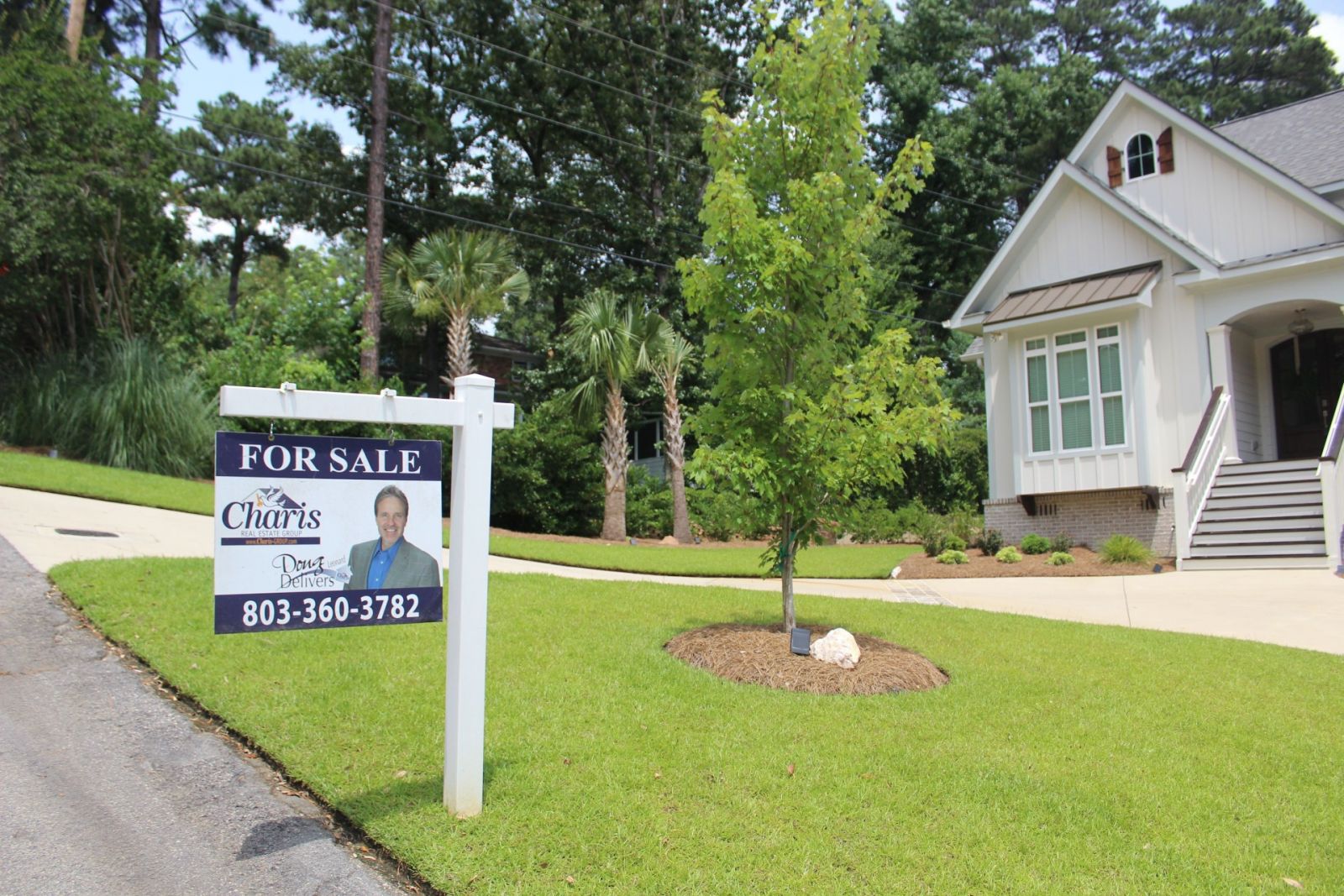Combination of factors fueling residential real estate frenzy
Contributing Writer //July 20, 2021//

By Christina Lee Knauss
Columbia realtor Graeme Moore, owner of The Moore Co., recently had an experience that would be considered highly unusual in almost any other recent era of real estate sales except this one.
He sold an expensive home to a couple moving to Columbia from across the country for work who had never even physically seen the home before or walked around inside it.
“We had met before and looked at some houses in person, but on that trip, they didn’t find anything that worked,” Moore said. “They couldn’t swing coming back out here again because of issues with work and their kids, so they ended up having to buy basically sight unseen, using only photos and a video.”
Buying a house without ever seeing it in person isn’t the only unusual thing going on in the real estate market these days.
Increasingly common among realtors are tales of buyers willing to go to great lengths in order to get into a house, with some even willing to forego recommended precautions like home inspections.
What’s fueling such actions? Simply, there are more buyers than there are places for them to live.
It’s a seller’s market like few others in recent memory — fueled by everything from low interest rates to pandemic-spawned changes in work and home preferences.
The market is booming Columbia, Charleston, Rock Hill, and the Grand Strand, as well as throughout the Carolinas and the Southeast.
The wild market is also fueling an increase in cash offers for homes to drive quick sales. Recently, two companies that specialize in all-cash offers — Opendoor and Ribbon — have expanded into the Columbia market after seeing high demand for their product in other parts of the Carolinas.
“It’s a classic supply-and-demand situation, with way more buyer demand than there is housing supply,” Moore said. “These conditions were present since before the pandemic and they’ve only intensified in the past 16 months. With COVID-19, everybody got scared and interest rates plummeted, and many people took their houses off the market. Now more people are looking to buy because it’s really cheap to borrow money, and there aren’t the houses out there on the market to fulfill the demand.
“Things are going to stay like this as long as interest rates remain low, the economy remains relatively healthy and we’re lagging in housing inventory.”
According to the most recent housing supply overview compiled by the South Carolina Association of Realtors, pending home sales in South Carolina were up 21% overall between June 2020 and May 2021.
The overall median sales price climbed by 14.2% to $257,000, while S.C. inventory levels dropped 54.7%.
Single-family homes dipped by 53.5%, according to the association, meaning that, on average, there is only enough of a supply of single family homes to last 1.1 months in the current market, and a 1.2-month supply of condominiums.
While much of the recent market frenzy is fueled by the pandemic, the seeds of it were planted back during the Great Recession from 2007-2009, according to Morris Lyles, a realtor and broker with ERA Wilder Realty in Columbia and 2021 president of the South Carolina Association of Realtors.
“After that 2008 crash, a lot of builders got out of the building business, and there was a hold on people developing property, and now we’re seeing a huge amount of pent-up demand that has built up since then,” Lyles said.
“A lot of people put off purchasing homes because they were living at home with their parents, finishing up college or other factors, and now they’re ready to get out into the world and buy homes. Now it seems like everybody is trying to do it at the same time.”
Lyles said low interest rates are another factor in the buying boom, as well as changes in people’s priorities about what kind of home they want to live in and what kind of job they want.
Forced to stay at home because of the pandemic, many people realized their current home no longer suited their needs, and the increased possibility of remote work has caused many people to seek out smaller, less stressful areas where the cost of living is lower. Columbia fits that bill for many people, Lyles said.
Those who were buying homes during the height of the pandemic often had to rely on video home tours and showings, and that trend, while subsiding a little as society opens back up, is still a larger factor in home sales than it was pre-pandemic, Lyles said.
In the frenzy to snap up the limited number of homes on the market, more buyers are willing to go the video route to determine if a house is for them, although Lyles said he encourages buyers to make every effort to physically visit a home before purchase.
“We’re hearing about people occasionally buying a house sight unseen these days, and I discourage that because you can’t get a good feel of a house without walking through it, and it’s very important to get a home inspection as well,” Lyles said.
The hot market is not only influencing buyers but also prompting some homeowners who want to get as much money out of their home as possible to decide to sell.
Empty-nesters, single people and those making a change in location because of remote work are among the new crop of sellers, and there are new companies offering services geared to getting the sellers paid and the homes on the market as quickly as possible.
On June 15, Opendoor, an online company headquartered in San Franscisco specializing in quick all-cash offers for homes, expanded into the Midlands with Columbia as one of six new markets the company entered that month. Founded in 2014, Opendoor offers what it calls a “one-click” approach for homeowners. People can go on the company’s website, upload some quick information and images, and receive an offer for their home from Opendoor within a few days in many cases.
Opendoor then puts the house on the market.
“Selling to Opendoor offers a lot of certainty in the process for the seller,” said Jon Enberg, regional general manager for Opendoor.
“They don’t have to worry about a deal falling through or when the closing date is going to be, and we take on the responsibility of making repairs or upgrades to the house when we purchase it.
“This takes a lot of risk out of the process for a seller.”
Another new cash-based option in the Midlands is Ribbon, a company with headquarters in New York City and Charlotte. Through what it calls “RibbonCash offers,” the company backs potential mortgage-eligible homebuyers with cash so they can expedite offers on homes.
The cash backing enables the buyer to get into the home and the seller to get their money more quickly, and the buyer then has up to six months to close on a mortgage. The company also works with real estate agents who want to expedite a sale with a cash offer.
“There’s been a huge surge of institutional, corporate buyers in this market, with companies buying up homes quickly, turning them into rental properties or reselling them, and in this kind of market an everyday family is losing out,” said Shaival Shah, co-founder and CEO of Ribbon.
“Through our approach, we’re automatically giving everyday buyers the ability to make an all-cash offer on a home and giving them a chance in this competitive market.”
Whether homebuyers and sellers choose one of these tech-based options or go the more traditional route, trends suggest that the market is going to remain competitive for quite a while.
Financial conditions motivating buyers are not likely to change for at least the next year, according to Jan Hadder, regional vice president in the builder division of the Columbia office of Silverton Mortgage.
Hadder noted that interest rates are expected to remain low, with the Federal Reserve not projecting any major fluctuations in interest rates through 2022.
Currently, interest rates on a 30-year, fixed-rate mortgage are hovering around the 2.8% range.
First time homebuyers also may get a boost from a recent announcement from the Federal Housing Association regarding student loan debt and how it affects potential buyers. The FHA is recalculating how student loan debt will be computed when figuring out debt-to-income ratios for mortgages.
The new policy allows lenders to use a borrower’s actual monthly student loan payment amount in the underwriting process, which is usually lower than a previous requirement to use 1% of the borrower’s total balance.
“This new calculation is an effort to remove barriers and provide more access to affordable financing to creditworthy individuals with student loan debt, which has a disproportionate impact on people of color, and could make a big difference for many people who have been waiting for the right time to try and purchase a home,” Hadder said.
This article first appeared in the July 19 print edition of the Columbia Regional Business Report.
p















